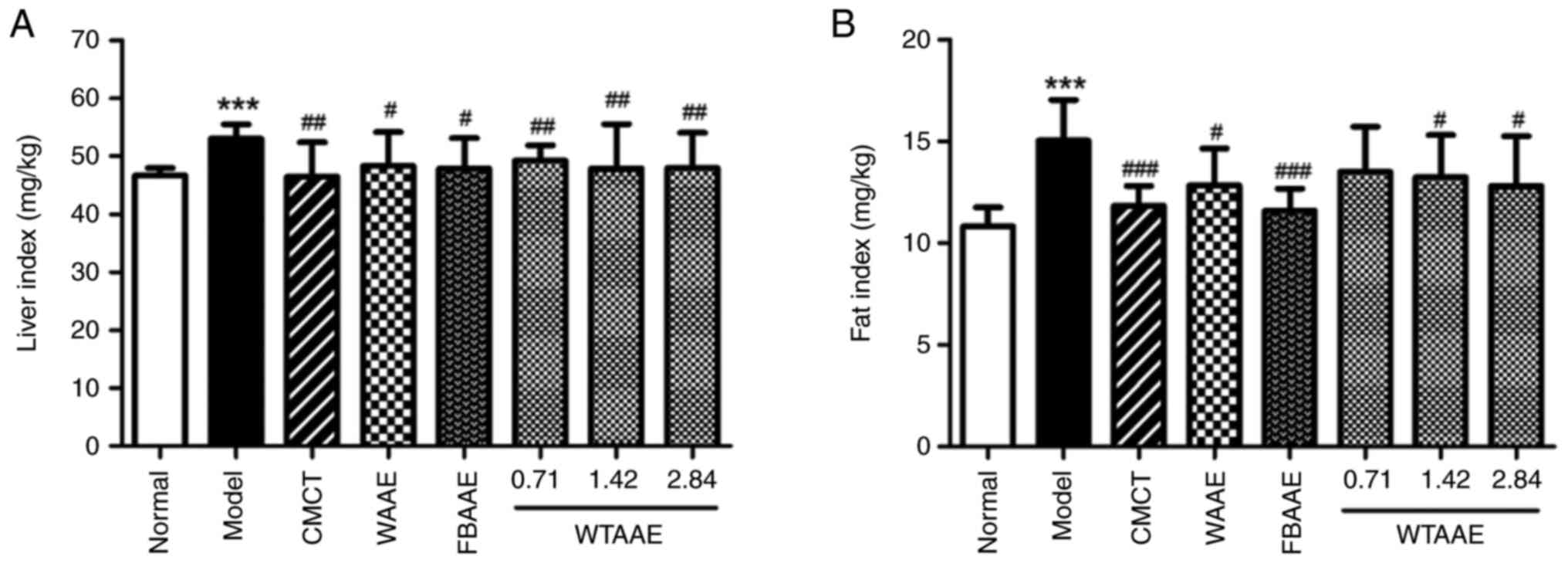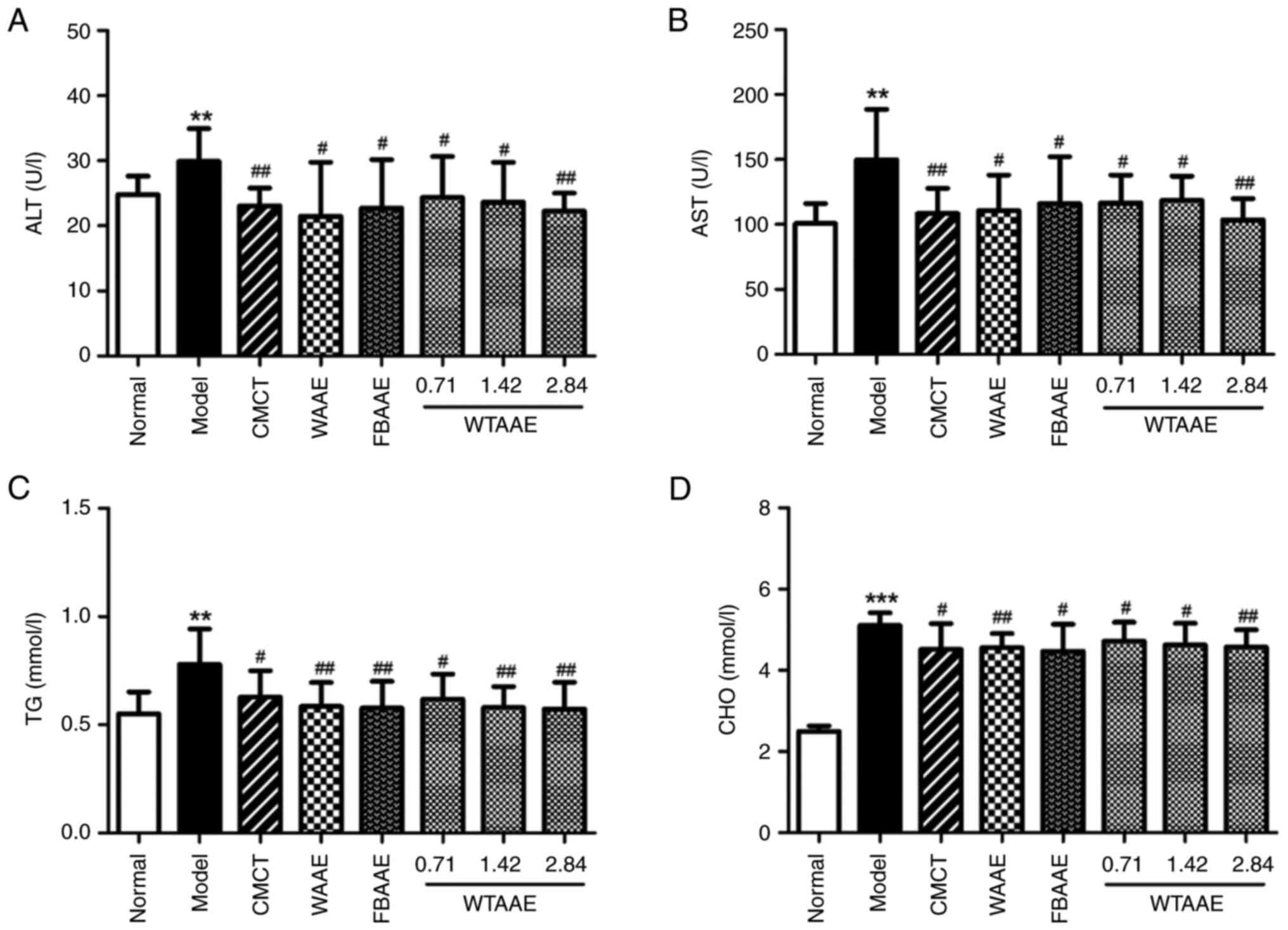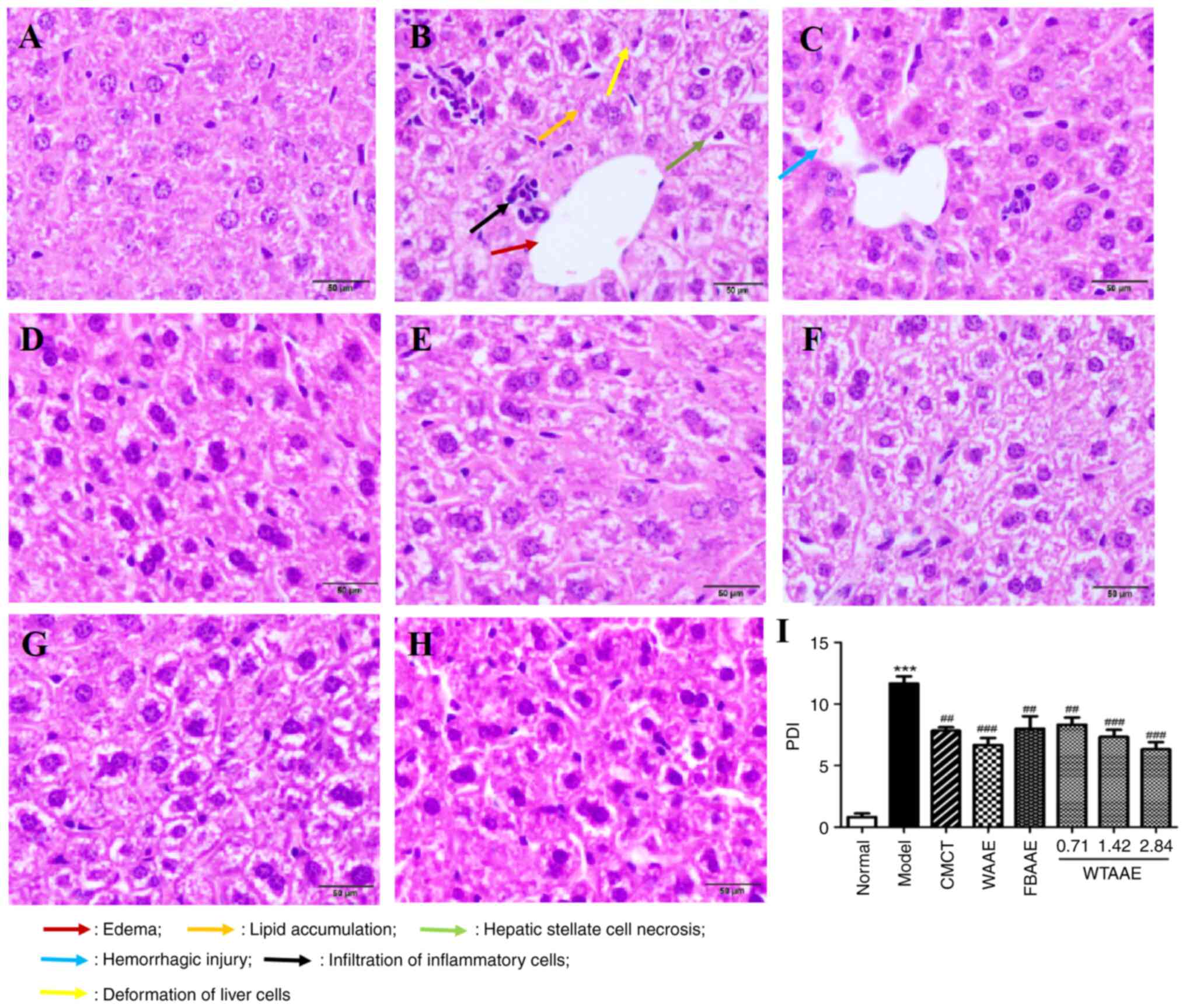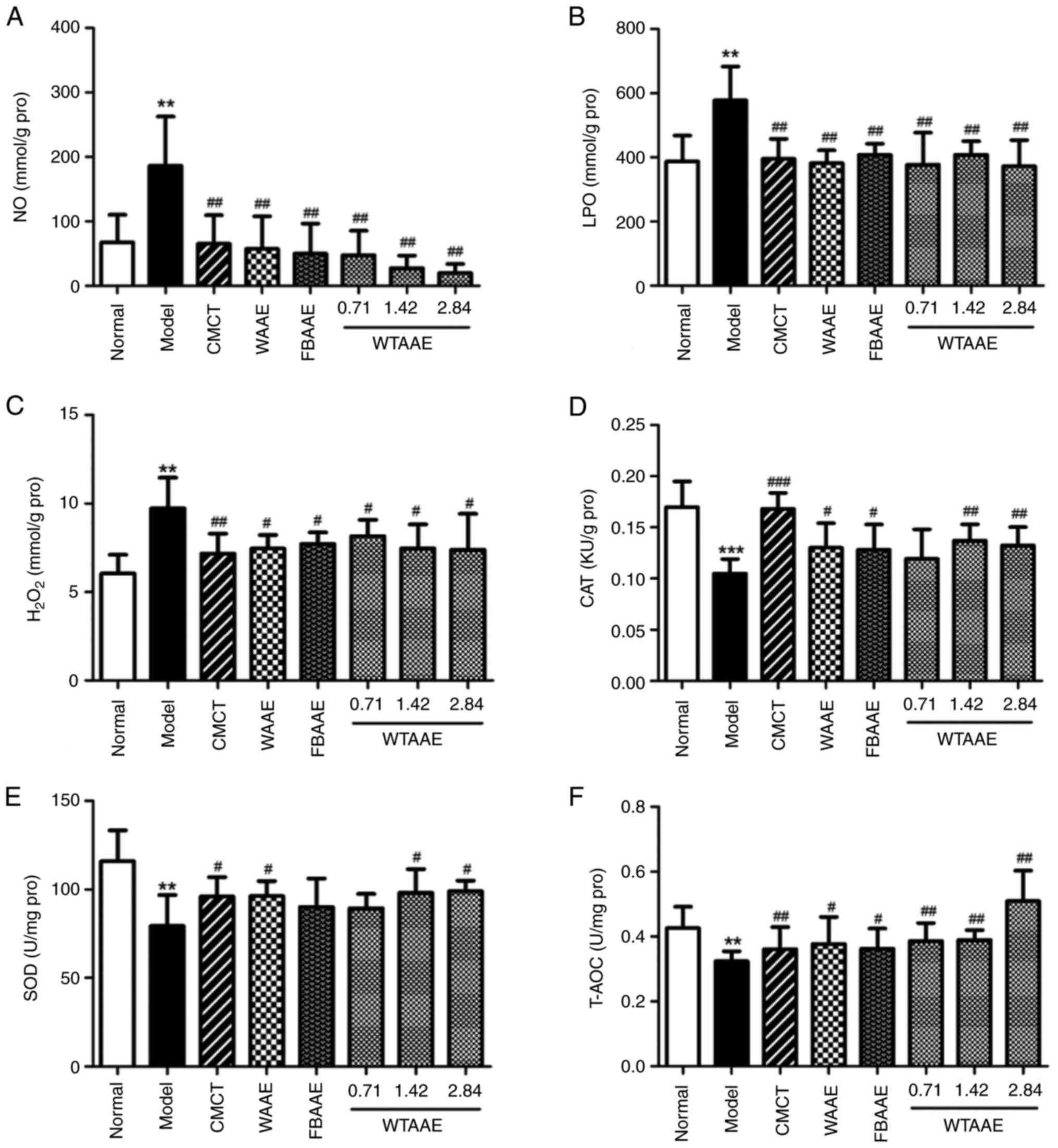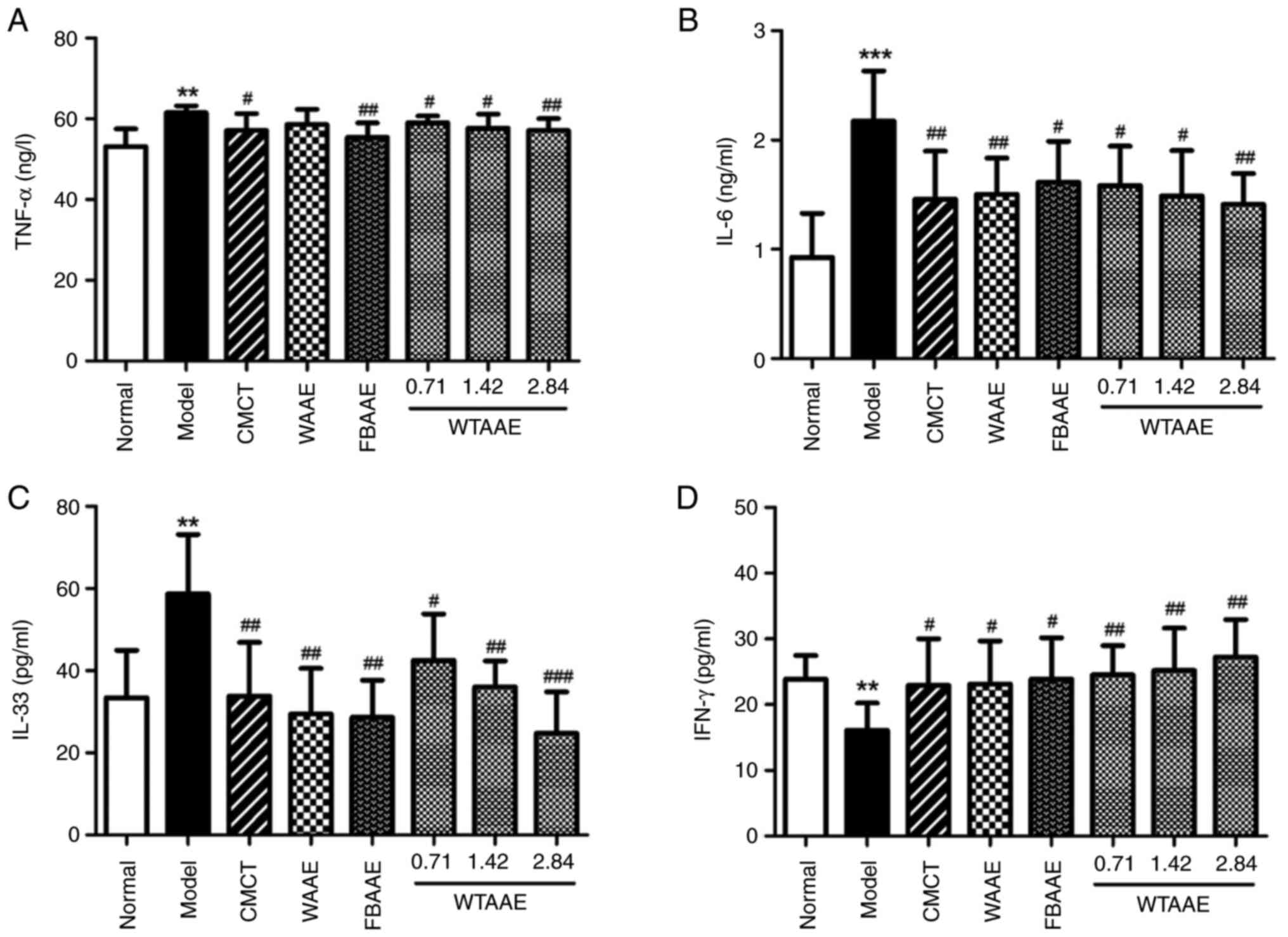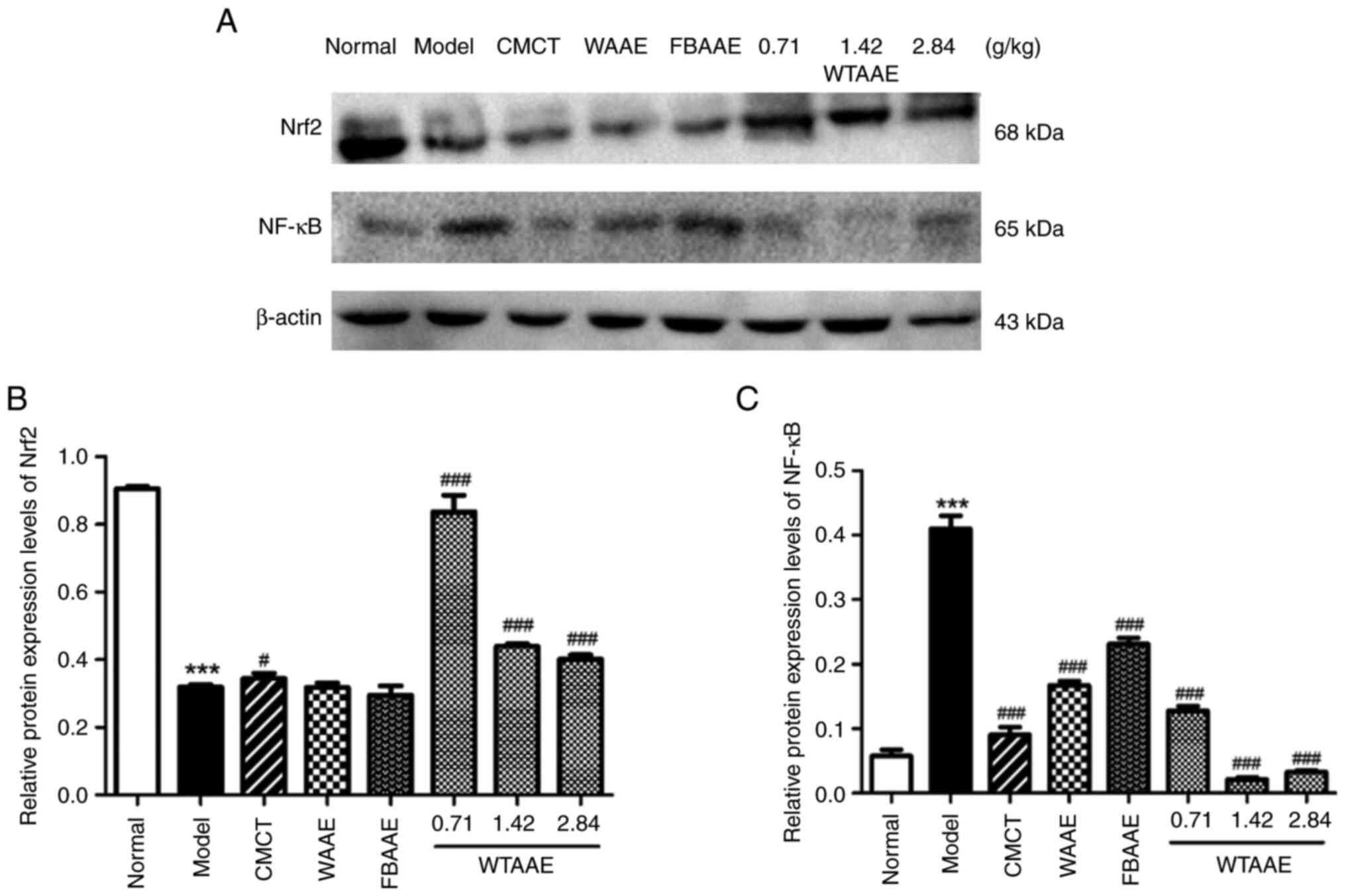|
1
|
Fan JG: Epidemiology of alcoholic and
nonalcoholic fatty liver disease in China. J Gastroenterol Hepatol.
28 (Suppl 1):S11–S17. 2013. View Article : Google Scholar
|
|
2
|
Zhong W, Zhao Y, Tang Y, Wei X, Shi X, Sun
W, Sun X, Yin X, Sun X, Kim S, et al: Chronic alcohol exposure
stimulates adipose tissue lipolysis in mice: Role of reverse
triglyceride transport in the pathogenesis of alcoholic steatosis.
Am J Pathol. 180:998–1007. 2012. View Article : Google Scholar : PubMed/NCBI
|
|
3
|
Lakshman MR: Some novel insights into the
pathogenesis of alcoholic steatosis. Alcohol. 34:45–48. 2004.
View Article : Google Scholar : PubMed/NCBI
|
|
4
|
Raghu R, Liu CT, Tsai MH, Tang X, Kalari
KR, Subramanian S and Sheen LY: Transcriptome analysis of
garlic-induced hepatoprotection against alcoholic fatty liver. J
Agric Food Chem. 60:11104–11119. 2012. View Article : Google Scholar : PubMed/NCBI
|
|
5
|
Sookoian S and Pirola CJ: Systems biology
elucidates common pathogenic mechanisms between nonalcoholic and
alcoholic-fatty liver disease. PLoS One. 8:e588952013. View Article : Google Scholar : PubMed/NCBI
|
|
6
|
Lieber CS: Alcoholic fatty liver: Its
pathogenesis and mechanism of progression to inflammation and
fibrosis. Alcohol. 34:9–19. 2004. View Article : Google Scholar : PubMed/NCBI
|
|
7
|
Ma D, Hu J, Xu W, Wang Y, Wang J, Li L,
Wang S, Zhou H, Li Y and Liu L: Phosphoesterase complex modulates
microflora and chronic inflammation in rats with alcoholic fatty
liver disease. Life Sci. 262:1185092020. View Article : Google Scholar : PubMed/NCBI
|
|
8
|
Guo H, Sun J, Li D, Hu Y, Yu X, Hua H,
Jing X, Chen F, Jia Z and Xu J: Shikonin attenuates
acetaminophen-induced acute liver injury via inhibition of
oxidative stress and inflammation. Biomed Pharmacother.
112:1087042019. View Article : Google Scholar : PubMed/NCBI
|
|
9
|
Zhuge Q, Zhang Y, Liu B and Wu MJ:
Blueberry polyphenols play a preventive effect on alcoholic fatty
liver disease C57BL/6 J mice by promoting autophagy to accelerate
lipolysis to eliminate excessive TG accumulation in hepatocytes.
Ann Palliat Med. 9:1045–1054. 2020. View Article : Google Scholar : PubMed/NCBI
|
|
10
|
Wang M, Zhang XJ, Feng K, He C, Li P, Hu
YJ, Su H and Wan JB: Dietary α-linolenic acid-rich flaxseed oil
prevents against alcoholic hepatic steatosis via ameliorating lipid
homeostasis at adipose tissue-liver axis in mice. Sci Rep.
6:268262016. View Article : Google Scholar : PubMed/NCBI
|
|
11
|
Wang Y, Mukhopadhyay P, Cao Z, Wang H,
Feng D, Haskó G, Mechoulam R, Gao B and Pacher P: Cannabidiol
attenuates alcohol-induced liver steatosis, metabolic
dysregulation, inflammation and neutrophil-mediated injury. Sci
Rep. 7:120642017. View Article : Google Scholar : PubMed/NCBI
|
|
12
|
Kong L, Chen J, Ji X, Qin Q, Yang H, Liu
D, Li D and Sun M: Alcoholic fatty liver disease inhibited the
co-expression of Fmo5 and PPARα to activate the NF-κB signaling
pathway, thereby reducing liver injury via inducing gut microbiota
disturbance. J Exp Clin Cancer Res. 40:182021. View Article : Google Scholar : PubMed/NCBI
|
|
13
|
Liu Y, Chen H, Yang Y, Zhang Z, Wei J,
Meng H, Chen W, Feng J, Gan B, Chen X, et al: Whole-tree
agarwood-inducing technique: An efficient novel technique for
producing high-quality agarwood in cultivated Aquilaria sinensis
trees. Molecules. 18:3086–3106. 2013. View Article : Google Scholar : PubMed/NCBI
|
|
14
|
Takagi K, Kimura M, Harada M and Otsuka Y:
Pharmacology of medicinal herbs in East Asia. Nanzando Tokyo.
41:187–188. 1982.
|
|
15
|
Zhu Z, Zhao Y, Huo H, Gao X, Zheng J, Li J
and Tu P: HHX-5, a derivative of sesquiterpene from Chinese
agarwood, suppresses innate and adaptive immunity via inhibiting
STAT signaling pathways. Eur J Pharmacol. 791:412–423. 2016.
View Article : Google Scholar : PubMed/NCBI
|
|
16
|
Zhu Z, Gu Y, Zhao Y, Song Y, Li J and Tu
P: GYF-17, a chloride substituted 2-(2-phenethyl)-chromone,
suppresses LPS-induced inflammatory mediator production in RAW264.7
cells by inhibiting STAT1/3 and ERK1/2 signaling pathways. Int
Immunopharmacol. 35:185–192. 2016. View Article : Google Scholar : PubMed/NCBI
|
|
17
|
Huo HX, Gu YF, Sun H, Zhang YF, Liu WJ,
Zhu ZX, Shi SP, Song YL, Jin HW, Zhao YF, et al: Anti-inflammatory
2-(2-phenylethyl)chromone derivatives from Chinese agarwood.
Fitoterapia. 118:49–55. 2017. View Article : Google Scholar : PubMed/NCBI
|
|
18
|
Zhou M, Wang H, Suolangjiba Kou J and Yu
B: Antinociceptive and anti-inflammatory activities of Aquilaria
sinensis (Lour.) Gilg. Leaves extract. J Ethnopharmaco.
117:345–350. 2008. View Article : Google Scholar
|
|
19
|
Sattayasai J, Bantadkit J, Aromdee C,
Lattmann E and Airarat W: Antipyretic, analgesic and anti-oxidative
activities of Aquilaria crassna leaves extract in rodents. J
Ayurveda Integr Med. 3:175–179. 2012. View Article : Google Scholar : PubMed/NCBI
|
|
20
|
Wang CH, Wang S, Peng DQ, Yu ZX, Guo P and
Wei JH: Protective effect of agarwood alcohol extracts produced by
whole-tree agarwood-inducing technique on the fluorouracil-induced
liver injury in mice. J Int Pharm Res. 45:187–197. 2018.
|
|
21
|
Wang CH, Wang S, Peng DQ, Liu YY, Guo P
and Wei JH: Protective effect of alcohol extract of agarwood on
acute liver injury induced by carbon tetrachloride in mice. Mod
Chin Med. 19:1091–1096. 2017.
|
|
22
|
Wang C, Peng D, Liu Y, Wu Y, Guo P and Wei
J: Agarwood alcohol extract protects against gastric ulcer by
inhibiting oxidation and inflammation. Evid Based Complement
Alternat Med. 2021:99446852021.PubMed/NCBI
|
|
23
|
Wang C, Peng D, Liu Y, Yu Z, Guo P and Wei
J: Agarwood alcohol extract ameliorates isoproterenol-induced
myocardial ischemia by inhibiting oxidation and apoptosis. Cardiol
Res Pract. 2020:36408152020. View Article : Google Scholar : PubMed/NCBI
|
|
24
|
Tan P, Liang H, Nie J, Diao Y, He Q, Hou
B, Zhao T, Huang H, Li Y, Gao X, et al: Establishment of an
alcoholic fatty liver disease model in mice. Am J Drug Alcohol
Abuse. 43:61–68. 2017. View Article : Google Scholar : PubMed/NCBI
|
|
25
|
Dong Q, Chu F, Wu C, Huo Q, Gan H, Li X
and Liu H: Scutellaria baicalensis Georgi extract protects against
alcohol-induced acute liver injury in mice and affects the
mechanism of ER stress. Mol Med Rep. 13:3052–3062. 2016. View Article : Google Scholar : PubMed/NCBI
|
|
26
|
Yeh MM and Brunt EM: Pathological features
of fatty liver disease. Gastroenterol. 147:754–764. 2014.
View Article : Google Scholar : PubMed/NCBI
|
|
27
|
Zhang Y, Park J, Han SJ, Park I, Huu TN,
Kim JS, Woo HA and Lee SR: The critical role of redox regulation of
PTEN and peroxiredoxin III in alcoholic fatty liver. Free Rad Bio
Med. 162:141–148. 2021. View Article : Google Scholar
|
|
28
|
Wang Z, Dou X, Li S, Zhang X, Sun X, Zhou
Z and Song Z: Nuclear factor (erythroid-derived 2)-like 2
activation-induced hepatic very-low-density lipoprotein receptor
overexpression in response to oxidative stress contributes to
alcoholic liver disease in mice. Hepatolo. 59:1381–1392. 2014.
View Article : Google Scholar
|
|
29
|
Park JH, Lee DH, Park MS, Jung YS and Hong
JT: C-C chemokine receptor type 5 deficiency exacerbates alcoholic
fatty liver disease through pro-inflammatory cytokines and
chemokines-induced hepatic inflammation. J Gastroentero Hepatolo.
32:1258–1264. 2017. View Article : Google Scholar
|
|
30
|
Wang C, Wang S, Peng D, Liu Y, Guo P and
Wei J: Agarwood extract mitigates intestinal injury in
fluorouracil-induced mice. Biol Pharm Bull. 42:1112–1119. 2019.
View Article : Google Scholar : PubMed/NCBI
|
|
31
|
Han X, Ding C, Zhang G, Pan R, Liu Y,
Huang N, Hou N, Han F, Xu W and Sun X: Liraglutide ameliorates
obesity-related nonalcoholic fatty liver disease by regulating
Sestrin2-mediated Nrf2/HO-1 pathway. Biochem Biophys Res Commun.
525:895–901. 2020. View Article : Google Scholar : PubMed/NCBI
|
|
32
|
Gao G, Xie Z, Li EW, Yuan Y, Fu Y, Wang P,
Zhang X, Qiao Y, Xu J, Hölscher C, et al: Dehydroabietic acid
improves nonalcoholic fatty liver disease through activating the
Keap1/Nrf2-ARE signaling pathway to reduce ferroptosis. J Nat Med.
75:540–552. 2021. View Article : Google Scholar : PubMed/NCBI
|
|
33
|
Zhao J, Wang Y, Wu X, Tong P, Yue Y, Gao
S, Huang D and Huang J: Inhibition of CCL19 benefits non-alcoholic
fatty liver disease by inhibiting TLR4/NF-κB-p65 signaling. Mol Med
Rep. 18:4635–4642. 2018.PubMed/NCBI
|
|
34
|
Gao X, Hong R and Li J: Gastroenterology
DO. Protective effect of silymarin on alcoholic fatty liver in rats
possibly via impairing nf-κb activation. Acta Univer Med Anhui.
2014.
|















